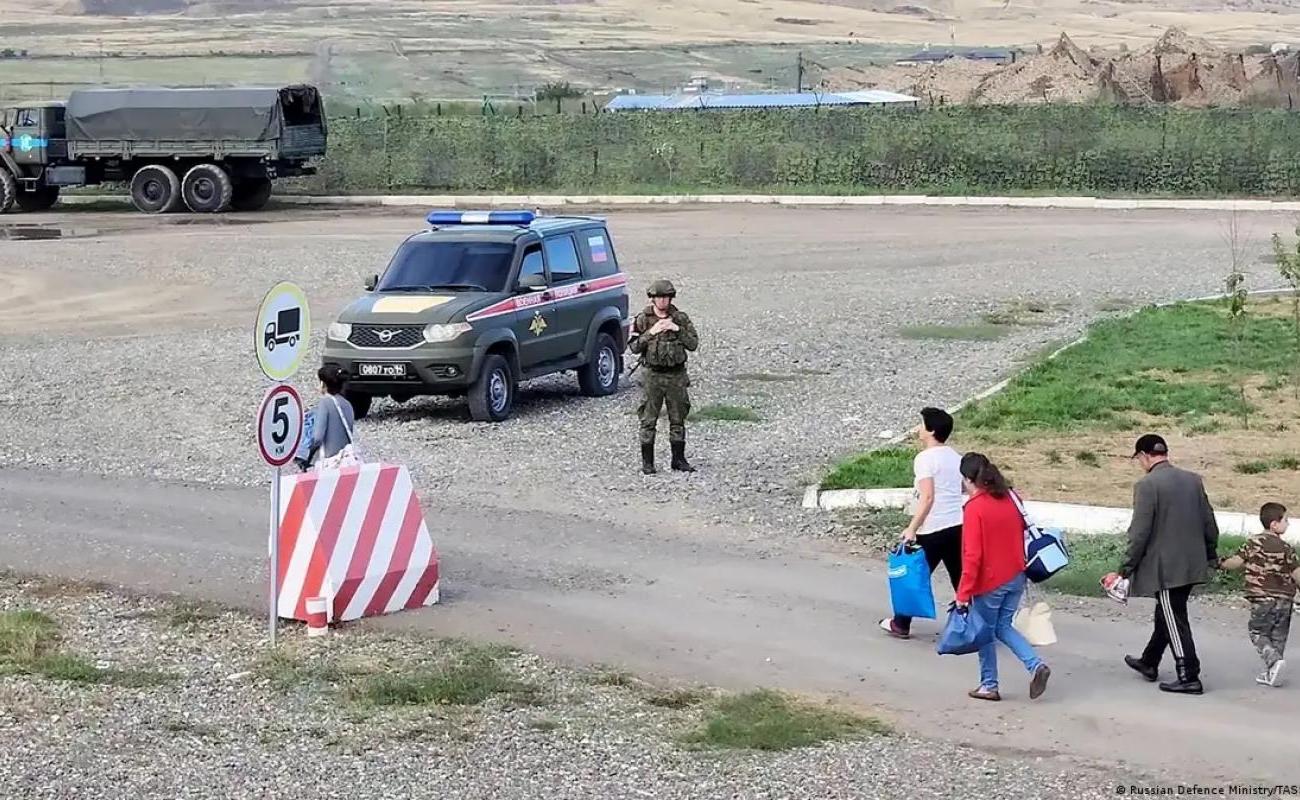Nagorno-Karabakh: What role does Russia play?

For Azerbaijan, the latest attack on the Armenian enclave of Nagorno-Karabakh was an "anti-terrorist operation of local character." For observers abroad, it seemed like the continuation of the 2020 war that already forced Armenians into painful concessions under the Russian-brokered peace deal.
With Moscow now hopelessly entangled in Ukraine, Armenia and Azerbaijan, who have contended over Nagorno-Karabakh for decades, could have escalated the fighting into a full-fledged conflict, forcing Russia and the world to face another prolonged crisis.
And then it was over. Just a day after the fighting started, leaders of the unrecognized "Republic of Artsakh," who have governed the Armenian-populated region since 1991, agreed to dissolve their forces and withdraw all heavy weapons, with Azerbaijan pledging safe passage for the fighters.
In Yerevan, Armenia's capital, Prime Minister Nikol Pashinyan refused to deploy the Armenian military to reinforce the enclave despite public pressure. The agreement also reportedly includes a stipulation for all Armenian soldiers to leave the area, a sensitive point for Yerevan because the Armenian government insists it has no troops in Nagorno-Karabakh.
"Armenia's hands were tied," said independent policy analyst Fuad Shahbazov from Azerbaijan. Any intervention from Armenia against their bigger and richer neighbor would "provoke a major conventional war … because Azerbaijan would consider this an act of invasion."
Russian peacekeepers help with evacuation
Russia, Armenia's traditional ally with 2,000 peacekeepers deployed in the area, also sought to de-escalate the situation. The commanders of the peacekeeping contingent mediated the cease-fire deal, and the troops themselves reportedly evacuated civilians out of the conflict zone.
Kremlin spokesman Dmitry Peskov described the crisis as "Azerbaijan's internal affair." While taking to Pashyanin on Wednesday, Putin "noted with satisfaction that it was possible to overcome the acute phase of the conflict."
The government in Baku, Azerbaijan's capital, is now preparing to start negotiations to integrate Armenians into the country, with details yet to be announced.
"Azerbaijan's forces and Azerbaijan also created favorable conditions for those who just want to leave Karabakh and not to live under Azerbaijan protection," Shahbazov said, adding that ethnic Armenians would be allowed to leave "with the help of Russian peacekeepers."
For German journalist and South Caucasus expert Silvia Stöber, the peace deal can be seen as a capitulation of ethnic Armenians in Nagorno-Karabakh and a "historical moment" after over three decades of conflict.
Pashyanin shopping for new allies
But why is Russia, who has stood by Armenia for over 30 years, now content with letting Azerbaijan carry an apparent victory?
One of the reasons is Yerevan's stance on Nagorno-Karabakh, with Prime Minister Pashinyan announcing Armenia was recognizing Azerbaijan's sovereignty earlier this year and apparently being unwilling to risk another humiliating defeat after 2020.
The other arguably more important reason is the deep tensions between the current governments of Russia and Armenia. While Pashinyan was never Moscow's favorite, he has started to openly defy the Kremlin and flirt with the West in recent months.
Armenian forces refused to participate in this year's joint drills with Russian soldiers but continued cooperating with the US military. In fact, American troops were in Armenia when Azerbaijan's recent operation in Nagorno-Karabakh began — the US military said the "Eagle Partner 2023" drill was completed on Wednesday as planned.
Armenia delivered humanitarian aid to Ukraine in September, and Pashinyan's wife, Anna Hakobyan, visited Kyiv. Most glaringly, Pashinyan went to international media to describe his country's reliance on Russia for security as a "strategic mistake" in light of Russia's involvement in Ukraine.
Pashyanin showed particular irritation at Russian peacekeepers not acting against Azerbaijan's alleged blockade of the Lachin corridor, the only road linking Armenia and the enclave in Nagorno-Karabakh.
"All of this … was supposed to be in the sphere of responsibility of Russian peacekeepers, and as far as these issues exist, the Russian peacekeepers have failed in their mission," the Armenian Prime Minister told Politico last week.
In an interview with DW, Armenian analyst and former lawmaker Styopa Safaryan accused Russia of trying to "punish Armenia for the so-called disloyalty, and it's doing with Azerbaijan's hands."
"This absolutely resembles the attack, the aggression of Russia in Ukraine. It's absolutely the same situation," he said, claiming that Russia was trying to push out the current government in Yerevan.
Azerbaijan's offer to Russia
South Caucasus expert Stefan Meister from the German Council on Foreign Relations sees Russia's motives slightly differently.
Meister believes Russia has no interest in a major conflict in the post-Soviet area due to its resources being tied up in Ukraine. He says energy-rich Azerbaijan likely made an offer to Russia to enable a transport corridor to Iran and possibly other deals related to oil and gas.
"Baku was in a good negotiating position, simply because of the Ukraine war and the necessity [for Russia] to find alternative trade routes and bypass sanctions," he told DW.
Regarding parallels between the Ukraine war and the Nagorno-Karabakh conflict, Meister also notes Baku was using Moscow as a role model.
"Humanitarian corridors are used to push people out. That is the logic and the cynicism that we know from Moscow and that we, unfortunately, see in Azerbaijan," he said.
Love between Russia and Armenia 'gone'
Researcher Ruben Enkopolov from the Barcelona Institute of Political Economy and Governance says there is only one way forward for Nagorno-Karabakh.
"The only scenario is the full transfer under Azerbaijani control," he told DW. "It will end with everything that is Armenian — gone." Enkopolov hopes this exodus would not amount to ethnic cleansing but says it will most likely be presented as a "forced evacuation."
And while Armenia will likely stay embittered over Moscow's inaction in Nagorno-Karabakh, it would still need to maintain ties with Russia as Armenia's biggest trading partner.
"There needs to be trade, but the love is gone," Enkopolov said.
